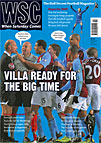 Football fans have, on the most part, been treated with disdain by politicians. The Football Supporters' Federation are now campaigning to make the laws fairer, as Bruce Wilkinson reports
Football fans have, on the most part, been treated with disdain by politicians. The Football Supporters' Federation are now campaigning to make the laws fairer, as Bruce Wilkinson reports
Often in the firing line between the rights of the individual and the power of the state, football supporters are once again the first to feel the force of new legislation.
The Football Supporters’ Federation has now joined civil-rights organisation Liberty to campaign against police use of Section 27 of the 2006 Violent Crime Reduction Act. The FSF is concerned that fans issued with the notice have been prevented from attending games even though no complaints have been received or charges made. Liberty’s involvement indicates the wider implications for freedom of movement and the right to assembly, both potentially affected by the act, with the greater political ramifications this underlines.
Section 27 allows the constabulary to move someone from a specified area for a period of up to 48 hours if they think there’s a possibility an alcohol-related offence may be committed. Via its campaign, called Watching Football Is Not A Crime!, the FSF is hoping to raise enough money to fight its use through judicial review. Liberty believes that the Human Rights Act can be employed to stop the use of the legislation and has made representations to the police. Recent Home Office statistics show that out of 37 million match attendances in England and Wales, only 3,842 arrests were made (one for every 10,000 fans) and it is understood that senior officers are dismayed at the heavy-handed approach taken by some of their colleagues in this relatively peaceful climate.
An estimated 80 Stoke supporters visited the Railway Inn at Irlam, Greater Manchester, on their way to their November fixture against United. Despite no reports of trouble, a number of officers from Greater Manchester Police entered the premises and told fans they could not leave the pub or go to Old Trafford and would be forcibly returned to the Potteries. Issued with a Section 27 notice, they were driven in convoy to Stoke, regardless of whether this was their home. Potters fan Lyndon Edwards, who is making a formal complaint to GMP and the Independent Police Complaints Commission, was one of those in the pub: “I asked for it to be stated on the Section 27 form that I was not intoxicated and that there was no evidence of any disorder on my part. This was refused so I refused to sign the form. I was told to sign it or I would be arrested and we were then loaded on to buses.”
“They were treated very badly by the GMP,” says Malcolm Clarke of the FSF. “This new law gives the police a great deal of instant power, which can severely affect the civil rights of fans. If they had any evidence the people in that pub included some risk supporters, or people with banning orders, they should have taken appropriate action against those people alone. There can be no excuse for taking this draconian action against innocent supporters. We are most concerned about how it is being used, and will be taking this up at the highest level.”
In another incident, 15 Plymouth Argyle fans on a trip to Doncaster Rovers were directed by club stewards to a pub a couple of miles from the ground. Despite the group including children and there being no hint of trouble, they were surrounded by police, forced to remain in the bar and served with Section 27 notices. Stopped from approaching the ground they were given a police escort across three counties back towards Plymouth, including a toilet break met by a police dog unit. Several other episodes under investigation include the use of the legislation against Southend followers at Crewe and Gillingham supporters halted on a trip to Aldershot. Anna Fairclough, legal officer for Liberty, commented: “It’s not only wrong, but also seriously counter-productive to treat all football fans as hooligans. Liberty intends to use the Human Rights Act to prevent abuses of this kind happening again.”
The violence of the 1970s and 1980s led eventually to smarter policing and tougher laws, and to Britain building a reputation for innovative crowd management that has been much copied across Europe. Under political pressure to deal with drink-fuelled trouble, the government has introduced ever stronger measures primarily aimed at post-pub altercations but with implications for law-abiding citizens. This latest development highlights the fine line between reasonable control and overly oppressive enforcement.
From WSC 264 February 2009